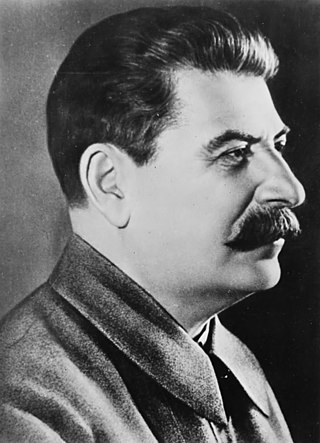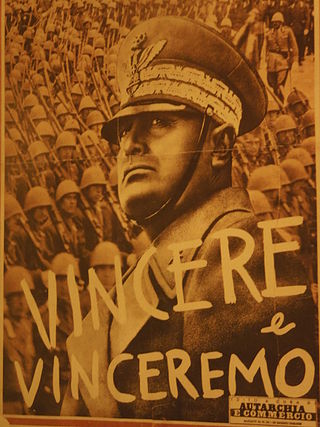
Fascism is a far-right, authoritarian, ultranationalist political ideology and movement, characterized by a dictatorial leader, centralized autocracy, militarism, forcible suppression of opposition, belief in a natural social hierarchy, subordination of individual interests for the perceived good of the nation or race, and strong regimentation of society and the economy.

Totalitarianism is a form of government and a political system that prohibits all opposition parties, outlaws individual and group opposition to the state and its claims, and exercises an extremely high if not complete degree of control and regulation over public and private life. It is regarded as the most extreme and complete form of authoritarianism. In totalitarian states, political power is often held by autocrats, such as dictators or absolute monarchs, who employ all-encompassing campaigns in which propaganda is broadcast by state-controlled mass media in order to control the citizenry.
In political science, a reactionary or a reactionist is a person who holds political views that favor a return to the status quo ante—the previous political state of society—which the person believes was better in some ways that are absent from contemporary society. As a descriptor term, reactionary derives from the ideological context of the left–right political spectrum. As an adjective, the word reactionary describes points of view and policies meant to restore a status quo ante.
Postmodernity is the economic or cultural state or condition of society which is said to exist after modernity. Some schools of thought hold that modernity ended in the late 20th century – in the 1980s or early 1990s – and that it was replaced by postmodernity, and still others would extend modernity to cover the developments denoted by postmodernity. The idea of the postmodern condition is sometimes characterized as a culture stripped of its capacity to function in any linear or autonomous state like regressive isolationism, as opposed to the progressive mind state of modernism.

Roger David Griffin is a British professor of modern history and political theorist at Oxford Brookes University, England. His principal interest is the socio-historical and ideological dynamics of fascism, as well as various forms of political or religious fanaticism.
Clerical fascism is an ideology that combines the political and economic doctrines of fascism with clericalism. The term has been used to describe organizations and movements that combine religious elements with fascism, receive support from religious organizations which espouse sympathy for fascism, or fascist regimes in which clergy play a leading role. It is a Christian form of the more general concept of Theofascism, where religious ideology is combined with Theocracy.
The Conservative Revolution, also known as the German neoconservative movement, or new nationalism, was a German national-conservative movement prominent during the Weimar Republic and Austria, in the years 1918–1933.
Karl Dietrich Bracher was a German political scientist and historian of the Weimar Republic and Nazi Germany. Born in Stuttgart, Bracher was awarded a Ph.D. in the classics by the University of Tübingen in 1948 and subsequently studied at Harvard University from 1949 to 1950. During World War II, he served in the Wehrmacht and was captured by the Americans while serving in Tunisia in 1943. Bracher taught at the Free University of Berlin from 1950 to 1958 and at the University of Bonn since 1959. In 1951 Bracher married Dorothee Schleicher, the niece of Dietrich Bonhoeffer. They had two children.

The history of fascist ideology is long and it draws on many sources. Fascists took inspiration from sources as ancient as the Spartans for their focus on racial purity and their emphasis on rule by an elite minority. Fascism has also been connected to the ideals of Plato, though there are key differences between the two. Fascism styled itself as the ideological successor to Rome, particularly the Roman Empire. From the same era, Georg Wilhelm Friedrich Hegel's view on the absolute authority of the state also strongly influenced fascist thinking. The French Revolution was a major influence insofar as the Nazis saw themselves as fighting back against many of the ideas which it brought to prominence, especially liberalism, liberal democracy and racial equality, whereas on the other hand, fascism drew heavily on the revolutionary ideal of nationalism. The prejudice of a "high and noble" Aryan culture as opposed to a "parasitic" Semitic culture was core to Nazi racial views, while other early forms of fascism concerned themselves with non-racialized conceptions of the nation.
"Islamofascism", first coined as "Islamic fascism" in 1933, is a term popularized in the 1990s drawing an analogical comparison between the ideological characteristics of specific Islamist or Islamic fundamentalist movements and short-lived European fascist movements of the early 20th century, neo-fascist movements, or totalitarianism.
What constitutes as a definition of fascism and fascist governments has been a complicated and highly disputed subject concerning the exact nature of fascism and its core tenets debated amongst historians, political scientists, and other scholars ever since Benito Mussolini first used the term in 1915. Historian Ian Kershaw once wrote that "trying to define 'fascism' is like trying to nail jelly to the wall".
Jeffrey C. Herf is an American historian of modern Europe, particularly modern Germany. He is Distinguished University Professor of modern European at the University of Maryland, College Park.
Palingenetic ultranationalism is a definition of "true fascism" proposed by political theorist Roger Griffin. The phrase was first coined by Griffin in his 1991 book The Nature of Fascism. A key element is the belief that fascism can be defined by what Griffin posits in his book to be the true core myth of fascism, namely that of the need for a counter-revolution to occur first before a "national rebirth", palingenesis, could then take place.
A secular religion is a communal belief system that often rejects or neglects the metaphysical aspects of the supernatural, commonly associated with traditional religion, instead placing typical religious qualities in earthly, or material, entities. Among systems that have been characterized as secular religions are communism, Juche, scientism, Maoism, Religion of Humanity, the Cult of Reason and Cult of the Supreme Being.

The Italian racial laws, otherwise referred to as the Racial Laws, were a series of laws which were promulgated by the Mussolini government in Fascist Italy (1922–1943) from 1938 to 1943 in order to enforce racial discrimination and segregation in the Kingdom of Italy. The main victims of the Racial Laws were Italian Jews and the native African inhabitants of the Italian colonial empire (1923–1947). In the aftermath of Mussolini's fall from power, the Badoglio government suppressed the laws. They remained enforced and were made more severe in the territories ruled by the Italian Social Republic (1943–1945) until the end of the Second World War.
Robert Soucy is an American historian, specializing in French fascist movements between 1924 and 1939, French fascist intellectuals Maurice Barrès and Pierre Drieu La Rochelle, European fascism, twentieth-century European intellectual history, and Marcel Proust's aesthetics of reading.
Nazism, the common name in English for National Socialism, is the far-right totalitarian political ideology and practices associated with Adolf Hitler and the Nazi Party (NSDAP) in Nazi Germany. During Hitler's rise to power in 1930s Europe, it was frequently referred to as Hitlerism. The later related term "neo-Nazism" is applied to other far-right groups with similar ideas which formed after the Second World War.
The Dark Enlightenment, also called the neo-reactionary movement, is an anti-democratic, anti-egalitarian, reactionary philosophical and political movement. In 2007 and 2008, software engineer Curtis Yarvin, writing under the pen name Mencius Moldbug, articulated what would develop into Dark Enlightenment thinking. Yarvin's theories were elaborated and expanded by philosopher Nick Land, who first coined the term Dark Enlightenment in his essay of the same name. The term "Dark Enlightenment" is a reaction to the Age of Enlightenment and apologia for the public view of the "Dark Ages".

The term republic without republicans refers to a situation in which a state is a republic, yet there is little or no supporting republicanism to be found amongst the population and/or the political elite. In such a situation, most people would actually prefer to found a new monarchy or restore an abolished dynasty, or – in a broader sense – oppose democracy.
Matthew Feldman is an Anglo-American historian, literary critic and political scientist. As Emeritus Professor in the Modern History of Ideas at Teesside University, and Professorial Fellow at the University of York, Feldman specializes in fascism and the far right in Europe and the United States. He consults on neo-Nazi terrorism, hate crimes and radical right extremism for Academic Consulting Services.







